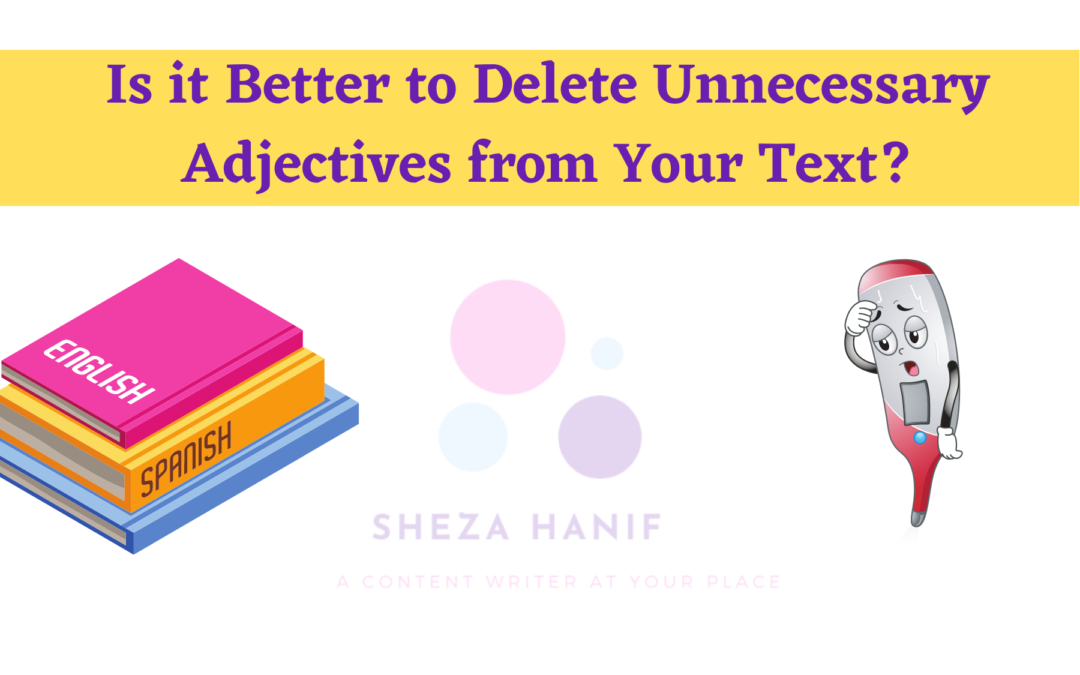Do not use unnecessary adjectives. That is one of the first lessons for people who want to write attractively. For example,
Roald Dahl gives this tip in a letter from 1980, in which he advises one of his readers on attractive writing and the use of adjectives (that is what adjectives are also called).
Dear Jay
I read your story. I don’t think it’s bad, but stop using too many adjectives. Read Hemingway, especially his earlier work, learn how to write shorter sentences and stay away from all those adjectives.
Better to write, ” She was a tall woman with a bosom ” than ” She was a tall woman with a shapely, prominent bosom, ” or some such nonsense. The first sentence says it all.
Using adjectives is tempting. Why?
With an adjective, you can provide additional information about a noun. You can highlight a characteristic of something or someone. For example, in a story, you talk about the blind man, and in a business text about an office with a beautiful view.
You can make your texts more attractive with adjectives. Do not go for unnecessary adjectives. Well-chosen adjectives present your reader with a sharper picture. And they give your sentences more meaning.
The car passed a red traffic light.
The drunken man paid for his chips with a bill of 100, and said, “Leave the rest.”
The white pigeons flew with rings in their beaks to Johnny and Anita.
In these sentences, the adjectives have a clear function. The adjective ‘red’ tells you that the driver of the car can expect a fine in the first sentence. The adjective “drunk” explains the strange behavior of the man in the second. And because you read about ‘white pigeons’ you immediately know in sentence 3 that you are dealing with a wedding.
The danger of adjectives
But adjectives don’t always add to the meaning of a sentence. If you use too many or too weak unnecessary adjectives, they make your texts less strong.
The tall, blond, stocky basketball player thought the ball into the basket.
Adored by many people, the actress took a dip in a very secluded lake during her well-deserved vacation.
This dynamic workplace ensures that our proactive employees can serve our customers very well.
There are 5 situations where you tend to use superfluous adjectives.
Attractive writing tip 1 – Don’t put adjectives after each other
Only put multiple adjectives behind each other in exceptional cases. Using too many of them is like adding so much seasoning to your meal that the flavor flattens out. One ingredient makes you taste the other less well.
Take the sentence about the tall blonde, stocky basketball player.
Make a choice. Which adjective is the most important? If you use two or three, none of the adjectives will stick to your reader.
The seated basketball player throws the ball into the basket.
This image is simpler and therefore stronger.
Of course, there are sometimes sentences in which adjectives can reinforce each other. From Roald Dahl’s story The Story Machine comes this sentence:
The second writer on the list attacked Knipe with a heavy metal paperweight.
Perhaps ‘metal’ would have been enough, but the addition of ‘heavy’ makes you almost see how the writer drops the object with a bang on the head of the main character Knipe.
Attractive writing tip 2 – Don’t make your adjective a stretched phrase
When adjectives combine to form a complete phrase, it often leads to confusion. Take the phrase about the ‘much-adored actress’. The adjectival clause distracts from the main clause, in which the actress takes a dip in a remote place (without) people.
Adjectival clauses can also lead to pincer constructions, which are sentences that are confusing because the main clause is interrupted by a subordinate clause.
In the Biesbosch, the beaver, which is very popular for its special fragrance, soft fur and environmentally friendly activities, is finally found again.
Attractive writing tip 3 – Don’t use clichés as an adjective
If you use clichéd adjectives, they add little to the image you’re adding to your reader. Take another dip, well-deserved vacation in the sense about the actress.
The words ‘fresh’ and ‘well-deserved’ are clichés. They almost automatically pop into your head during ‘dive’ and vacation. But what do these adjectives add?
When diving in a lake the water is usually fresh, and a vacation is usually deserved.
Even less attractive are clichéd adjectives that can have multiple meanings (also called smurf words). For example, companies often look for ‘proactive employees’, and they promise a ‘dynamic work environment’. The meaning of these words is to say the least vague, you do not paint a clear picture for your reader.
In short: avoid clichés and think about every adjective: what do I want to convey to the reader?
Attractive writing tip 4 – Be economical with superlatives as an adjective
Almost every day I cycle past a daycare centre with the following slogan on the wall: growing up is a special adventure.
You may wonder why the adjective was added special. An adventure is always special, otherwise, it is not an adventure.
But let’s be honest: I am also often guilty of using superlatives as a noun. A colleague only pointed out that the adjective keeps popping up in my blogs, for example when I discuss books or promote writers.
Of course, it’s okay to occasionally use adjectives like “great,” “special,” or “fantastic,” as long as you realize that superlatives aren’t making it clear why what you’re promoting is so good.
This was an ideal vacation.
The food tasted fantastic.
You really should read this great book.
These adjectives say more:
This was a restful vacation.
The food was seasoned perfectly.
You should really read this exciting book.
Attractive writing tip 5 – Avoid words like ‘very’ and ‘very’
Do not use adverbs to give unnecessary adjectives more weight. Words such as ‘very’, ‘very’, ‘very’ and ‘special’ can actually always be deleted. They make your sentences needlessly long, and they add little.
The special big bear danced in the circus.
The very kind clown gave the boy a balloon.
That was one whole long beach walk.
A well-chosen adjective alone says enough. Do you want to emphasize that the bear was really very big? Then choose a better adjective.
The giant bear danced in the circus
Delete adjectives, it remains difficult
Incidentally, even the best writers sometimes sin with unnecessary adjectives. The temptation is simply to go into detail or to add a description.
Read more:
Entry Level Copywriter Jobs: Let’s Talk About
9 Ways to Find Freelance Writing Clients Who Will Actually Pay You
6 unexpected ways you’ll benefit from writing content
The Importance of Article Writing And How To Do It Effectively
“Never start a sentence with …” – 7 Writing Rules You Should Ignore
Writing an Introduction? This Step-by-Step Guide Will Help You
Finding Synonyms: 11 Tips for Varied Word Use in Your Texts
Do You Use Prepositional Phrases? Delete These 11 Expressions


Very clear internet site, thanks for this post.